#the playwright’s death he’s just like that.
Note
just saw asteroid city last night, pls explain the proposed significance of the kiss!!
answering this publicly hope thats ok! cant do a readmore im on mobile *****asteroid city spoilers below beware*****
i dont remember anyones names so this is gonna sound partly unhinged. okay so the edward norton playwright and jason schwartzman actor (not character, in the black and white parts) are lovers right. tbh i thought this was kind of a gag and forgot about it. but later we find out that the playwright died 6 months into the production. i didnt make the connection that THAT’s why the actor-jason has to suddenly leave the stage and freaks out backstage about how he’s not sure he’s Doing it right. hes not talking about acting!! because he himself is literally grieving his lover while he’s playing a character who’s grieving his wife written by his lover so obviously it’s too much!!! actor-jason is trying to find meaning in his death through his writing but there isnt any meaning in death [gerris drinkwater voice] which is what the play is trying to say anyway. he doesnt think he’s performing grief right even in his own life!!! (and tbh it’s the 50s so he wouldnt be able to perform grief publicly anyway!!!!) the play starts with a car accident… anyone would search for some hidden meaning there, some sign…. so when he talks to margot robbie outside it’s not really about finding the CHARACTER’s motivations it’s about the actor himself being able to process the playwright’s death! and adrien brody director was probably also dealing with that too (him and norton seemed to be good buddies) so the whole “sleeping backstage” thing gets a bit sadder maybe? maybe everyone else got this in the theatre and im just stupid lol but crazy making stuff to me!!! the whole story is about sublimated gay grief that cannot be expressed?!?!
the tweet that caught me onto this was here which posits that the playwright’s death was a suicide but i think that’s pretty stupid and unnecessary because the whole thing about the play asteroid city is that death is random and meaningless. im pretty sure that’s what the alien represents— a shocking and absurd event that isnt outright evil or menacing, not something anyone can predict or make sense of, it’s just a thing that happens to you out of nowhere, it doesnt mean anything. he’s a little black figure, he’s death! giving and taking! aagh
#you’re the wife who played my actor :(#posthumus#asteroid city#imagine youre in love with a playwright and he writes a play before he even meets you about how you cant get over his death which hasnt#happened yet. id go insane too#im going to see it again to see how this informs the whole thing because its driving me crazy#rewatching the performances knowing that they're performing people performing. augh.#remember when bryan cranston accidentally appears in frame. rending my garments#also ‘you cant wake up until you fall asleep’ confused me a bit but then i remembered that the margot robbie scene was supposed to be put o#as a dream sequence and it makes sense now. thanks#aliens are the new fairytale monster symbol of death. the ultimate Unknowable#EDIT okay i read the wikipedia summary got some facts wrong adrien brody is sleeping in the theatre during rehearsals so its not because of#the playwright’s death he’s just like that.
2K notes
·
View notes
Text
A twist on the 1589 meeting, but what if Hob had acted fast when he spotted Dream’s interest in Shaxberd and instead of just getting jealous, he’d invited Will and Marlowe to their table as well?
Shaxberd is only barely getting started as a playwright. Hob and Marlowe seem acquainted. They might well have accepted the invitation to all dine together. It would be a natural thing to do at a tavern after all.
Because now I’m imagining the look on Dream’s face when this starving playwright he’s trying to cruise lights up at the prospect of the banquet laid out in front of Hob thus robbing Dream of his convenient escape. And from Shaxberd’s point of view, this is Hob’s guest, right? Hob is clearly a man of some importance and it would be rude to drag his guest away to talk business. Especially if it means a free meal of such quality.
So anyway, this is how Dream got stuck at a four hour long dinner with Hob, Kit Marlowe, and Will Shaxberd over some rather excellent mortal food and a much better time than he ever expected to have and frankly being more than a little pissed off about it and how Death might have been right that hanging out with humans can be fun.
It’s also the story about how Hob got 10x more answers than he ever got before out of his stranger by dint of the longer time together and how awkward it would be for Dream not to answer some of them with two other people present ruining the mystery of it all. It’s also how Hob figured out that Dream likes talking about art and so Hob was able to switch gears in time to actually have a conversation with Dream that didn’t make it look like Dream he would rather gouge his eyes out than listen to another word. Hob might not be the artistic sort but he’s not totally incapable of analyzing a play about a man making a supernatural bargain with the devil, and everyone at the table loved Marlowe’s Doctor Faustus.
And it’s the story of how Marlowe figured out in .2 seconds that an otherworldly creature was at the table with them and subtly helping out Hob direct his questions for best possible effect, and how both Marlowe and Shaxberd got a rich patron out of it.
#dreamling#fic prompt#1589#I’m already writing a 1589 fic of a different stripe but this idea tickled me#free to a good home
869 notes
·
View notes
Text
"At the risk of stating the obvious, no woman can mate with a bull and produce a child. Recognizing this simple scientific fact, I am led to a somewhat interesting suspicion: King Minos did not build the labyrinth to imprison a monster but to conceal a deformed child, his child.
While the Minotaur has often been depicted as a creature with the body of a bull but the torso of a man, centaur-like, the myth describes the minotaur as simply having the head of a bull and the body of a man, or in other words, a man with a deformed face. I believe pride would not allow Minos to accept that the heir to the throne had a horrendous appearance.
Consequently, he dissolved the right of ascension by publicly accusing his wife Pasiphae of fornicating with a male bovine.
Having enough conscience to keep from murdering his own flesh and blood, Minos had a labyrinth constructed, complicated enough to keep his son from ever escaping but without bars to suggest a prison. (It is interesting to note how the myth states most of the Athenian youth "fed" to the Minotaur actually starved to death in the Labyrinth, thus indicating their deaths had more to do with the complexity of the maze and less to do with the presumed ferocity of the Minotaur.)
I am convinced Minos' maze really serves as a trope for repression. My published thoughts on this subject (see "Birth Defects in Knossos"Sonny Won't Wait Flyer, Santa Cruz, 1968) inspired the playwright Taggert Chielitz to author a play called *The Minotaur* for The Seattle Repertory Company. As only eight people, including the doorman, got a chance to see the production, I produce here a brief summary:
Chielitz begins his play with Minos entering the labyrinth late one evening to speak to his son. As it turns out, the Minotaur is a gentle and misunderstood creature, while the so-called Athenian youth are convicted criminals who were already sentenced to death back in Greece. Usually King Minos has them secretly executed and then publicly claims their deaths were caused by the terrifying Minotaur thus ensuring that the residents of Knossos will never get too close to the labyrinth. Unfortunately this time, one of the criminals had escaped into the maze, encountered Mint (as Chielitz refers to the Minotaur) and nearly murdered him. Had Minos himself not rushed in and killed the criminal, his son would have perished. Suffice it to say Minos is furious. He has caught himself caring for his son and the resulting guilt and sorrow ineeses him to no end. As the play progresses, the King slowly sees past his son's deformities, eventually discovering an elegiae spirit, an artistie sentiment and most importantly a visionary understanding of the world. Soon a deep paternal love grows in the King's heart and he begins to conceive of a way to reintroduce the Minotaur back into society. Sadly, the stories the King has spread throughout the world concerning this terrifying beast prove the seeds of tragedy. Soon enough, a bruiser named Theseus arrives (Chielitz describes him as a drunken, virtually retarded, frat boy) who without a second thought hacks the Minotaur into little pieces. In one of the play's most moving scenes, King Minos, with tears streaming down his face, publicly commends Theseus' courage. The crowd believes the tears are a sign of gratitude while we the audience understand they are tears of loss. The King's heart breaks and while he will go on to be an extremely just ruler, it is a justice forever informed by the deepest kind of agony."
House of Leaves by Mark Z. Danielewski
pg. 110-111
257 notes
·
View notes
Text
Rhysand x Playwright! Reader (Enemies to Lovers)
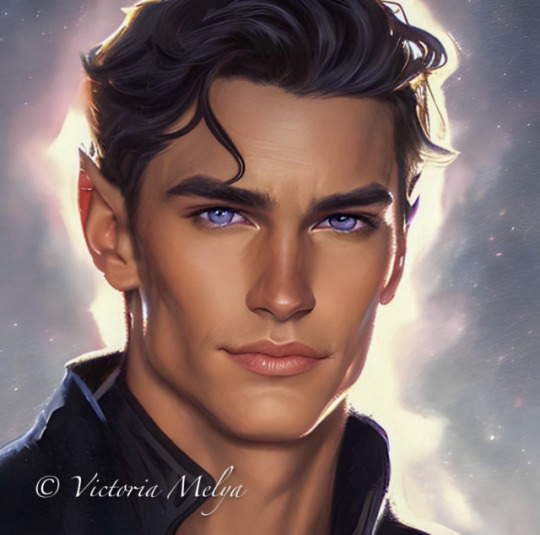
“You’ll regret it, darling…” The voice reverberated in her head, but Y/N batted it away. The last thing she needed was Rhysand’s phantom voice today haunting her. Especially today. Because today she’d be unveiling her newest creation to the High Lord of the Day Court, Helion, his court, and all of his people.
The Night Court weren’t necessary enemies with the Day Court, but Helion and his people certainly got a good laugh at her plays poking fun at the brooding High Lord. Best of all, if Helion liked her play, then she would get the Helion Award for Playwriting Excellence. Maybe then she could use that clout to write about whatever she wanted.
The Day Court had a rich culture, and history, and Y/N yearned to write plays about those. Unfortunately the only way in to the world she loved so much was to create works honoring Helion, and making sure he came across the best out of all the other High Lords.
Surely Rhysand’s threats at the ball meant nothing, she thought as she straightened the jacket of the actor playing him backstage, just for something to do. He just wanted to seem scary. Which was entirely the point of tonight’s play. To take the wind sails out of him. Once people laugh at something, they cease to fear it. She hoped it would work on her too. She’d paced the rooms of one of the Day Court’s many libraries in anticipation of this night. She’d be damned if Rhysand found a way to ruin it.
~
Thousands of miles away, Rhysand primped in his bedroom at his well-lived in townhouse in Velaris, the City of Starlight. A city that the rest of the Night Court, and the rest of Prythian in fact, including the part Y/N lived in, did not know existed.
Aside from a whole city, the rest of the world had no idea of the genuine friendship Rhysand had with his tight knit group of friends he called his Inner Circle. They weren’t afraid of him. Not in the slightest.
“Please let me come along,” Mor said with a grin, settling on Rhysand’s bed as he got ready for his not-so-welcome guest appearance at Y/N’s play.
“Mor,” Rhysand began, but then Cassian poked his head in too.
“An entire play devoted to making fun of you? Tell me again why I can’t come,” Cassian drawled, barely containing his laughter.
“I won’t look as intimidating if I come in with other people,” Rhysand said unconvincingly.
“It works for the people of Hewn City,” Mor protested, twisting her long blonde locks. “What about if we go in through the back, and Cassian pretends he’s in costume, or something?”
“People don’t usually go in costume to watch plays,” Rhysand replied, brushing invisible lint off his jacket.
“Rhys, have you been to a production of Rocky Horror in Velaris?” Mor asked, shocked.
“Oh, he’s a Rocky Horror virgin?” Cassian grinned. “As soon as you kidnap that girl, we should take both of you. Rocky Horror is the place to hook up.”
Rhysand tried to laugh off his best friends’ comments. “What makes you think I want to hook up with her?”
Morrigan gave Rhysand a knowing look. “Anyone else you would have killed. Well, in the Court of Nightmares anyway. Anywhere but here. What’s so special about this girl?”
Rhysand thought about it for a second. “We met at one of Helion’s balls, and when I threatened her with certain death to stop, she still didn’t back down.”
“Seems like theater is very important to her,” Mor noted. “That or pissing you off.”
“I like her already,” Cassian crowed. “Promise we get to meet her soon? We can give her some new material for her next plays? Azriel and Amren too once they get back from that mission.”
“No,” Rhysand insisted. “She can’t meet you guys right away. Especially not you and Azriel. She has to be scared of me and think she’s coming here to be punished.”
“Well, we can,” Cassian began, but Rhysand interrupted, “No,” firmly.
“Don’t be too hard on her,” pleaded Mor. “You should know what it’s like to love something so much you’d do stupid things for it.”
“I do,” Rhysand admitted. “You know, I still don’t have a mate yet.” Cassian clapped his back at this and chortled. Rhysand continued, “If she’s willing to make an enemy of me, the most powerful High Lord in Prythian, over this, then she can be just brave enough to be High Lady of the Night Court.”
~
Backstage at Helion’s Theater, Y/N joined hands with her actors. She did not tell them about the threat she got from Rhysand, or mount even more pressure on them by mentioning the award they might possibly get. That way, she decided, they would perform their best and not be nervous. She passed the energy to the male next to her that she got from the female on her other side. It was a beloved, time honored tradition that Y/N was eager to partake in.
Her heart was in her throat as the play started, but as it went on, she started to relax a little. The roof didn’t cave in from shaking mountains so close by. She didn’t get any jump scares backstage.
Then Act 3 came. Everyone was laughing at the actor in the Rhysand costume talk about feminism as if he’d only taken a freshman year womens’ studies course at the local university. It was to poke fun at how behind womens’ rights were in the Night Court compared to…at least the Day and Dawn Courts. Y/N was grateful that since Helion was queer himself, everyone in his court was made to feel comfortable to be their true selves publicly. Rhysand would probably have them hung up and shamed publicly. So he deserves this, she thought.
Suddenly a huge thunderclap sounded through the theater. Then came a swirling black cloud onstage. Oh fuck, Y/N thought. There was only one person who could make an entrance like that. The actors were frozen with fear. Hmmm, maybe in hindsight I should have told them that Rhysand threatened me, Y/N thought.
Rhysand didn’t say anything for a while, drinking in everyone’s fear. He’s probably loving this, Y/N thought, rolling his eyes.
“Helion,” he announced. “I’m surprised at you. If you wanted war, you could have just said so.”
Helion scoffed from the balcony. “Come on, Rhysand,” he shouted from the balcony. “Can’t you take a joke?” But there was a tremor in his voice.
“I let this go on for much longer than you deserve, Helion,” Rhysand said steely. “I demand retribution, if you really don’t want war.”
Helion sighed as if this was a big favor, probably to look good in front of all his people. “I suppose. What do you want?”
“The writer of this play,” Rhysand said simply. “Or everyone here will die.”
Oh shit, he was serious about that? Y/N thought frantically.
“Oh good,” he said as if reading her mind. “She’s here. Come on out darling. I won’t bite...here.”
I could run, she thought. I could make a run for it. But then he’d catch me since he could hear my thoughts.
“You’re right,” he chuckled, to the confusion of the audience. “Should I give you until the count of 3? I could kill three people as I do so.” He surveyed the audience of now frantic theatergoers. “Will that be funny enough for you?”
Fuck, she thought as she reluctantly stepped out onstage. She could see Helion with his head in his hands in the balcony, narrowly avoiding a political disaster. She guessed she would be the sacrificial lamb for that. And to think doing the plays for Helion was going to be a way to catapult me into a better life of creative expression and freedom and making change through art.
Now she would be sentenced to torture in the Night Court, all because Helion wasn’t brave enough to take on Rhysand. But she was. “So what?” she demanded. “You’re going to kill me? Go ahead. Then everyone will see how horrible you are and how right I was.”
She closed her eyes, bracing for impact. The she felt something horrible. Her mind being cleaved open and something creeping in.
~
You’re really not afraid of me, are you? Rhysand thought, and it echoed inside her head.
No! she shot back. But then she thought about the legendary Court of Nightmares and it took everything in her to keep from trembling. She couldn’t live like that forever.
So you are scared, Rhysand taunted, raising an eyebrow.
Please don’t take me there, Y/N relented. Just kill me now. Make an example of me, or whatever. Please just don’t let me-
But Rhysand merely said, “I warned you, darling.”
Y/N’s heart started beating faster and she started looking for a prop dagger, hoping if she stabbed it into herself hard enough, she could take herself out of this. It would look bad for both Helion and Rhysand. But Rhysand wrapped an arm around her, whispering “Oh no you don’t” and the black cloud that circled him before started circling both of them. When they were out of sight of everyone else, he whispered, “It won’t be that bad. There was no need for you to try that. Not that it would have done anything.”
“I hate you,” Y/N said, truly dreading her time at the Night Court with this monster. She squeezed her eyes shut as she felt swirling winds.
“I know,” Rhysand replied as Y/N stopped feeling the whipping wind against her face and her nose was engulfed with, rather than burning flesh, notes of jasmine and freesia.
(1642 words.)
#enemies to lovers rhysand#rhysand#a court of thorns and roses#acotar#rhys acotar#rhysand headcanons#rhysand imagines#rhysand x reader#acotar fic#acotar fanfiction#acotar x reader#acotar imagine#acotar x you
116 notes
·
View notes
Text
Intergenerational Trauma Challenge - 180 Degree Longitude Passes Through Us
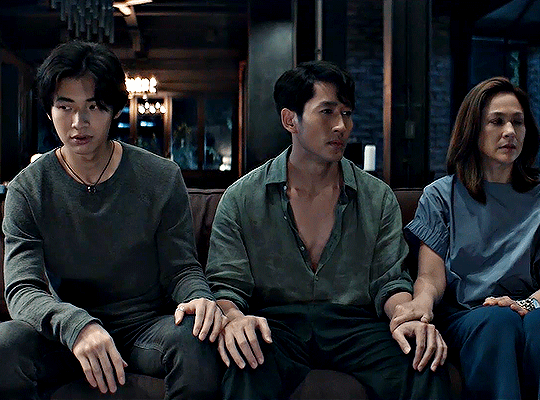
It’s winter and I’m huddled up in my house hiding from the cold weather, so obviously this is the perfect time to tackle another entry on the intergenerational family trauma challenge list. This week I finally watched 180 Degree Longitude Passes Through Us, a Thai drama about Wang, a young man just coming of age who is desperately seeking answers about his father’s death; Sasiwimol, Wang’s very complicated mother who does not want to dig up the past; Inthawut, his father’s best friend who has been hiding from it for years; and Siam, the black hole at the center of this story.
Before I dig into the trauma themes, let me just say that this show is excellent, if not for everyone. It has a very intentional style that makes it feel like a stage play—the writer is a playwright—and it’s basically eight episodes of very intense conversations. It’s not a romance and there’s an intellectualism in the writing that I found kept me at an emotional remove from the characters even as I marveled at how well crafted the dialogue is. And the dialogue is very important, which is why the translation of this drama is much stronger than we typically get from Thai productions—the words matter. It’s also loaded with visual metaphors and is all around beautiful to look at, and the three main performers are fantastic. I highly recommend it to anyone who likes theater, stories about complicated families, or beautiful and talented actors showing their work. And more than anything else, this show does incredibly strong thematic work and its messaging is on point: this is a story about how noble idiocy ruins lives.
So, with that said, onto the trauma! Spoilers ahead, and I am assuming anyone reading past this point has watched the show. Some themes you’ll see in this one: taboo, denial of queer identity, homophobia, filial piety, and lots of emotional manipulation. Shoutout to @bengiyo and @twig-tea for reading this to make sure I didn’t miss anything in this complex story.

There are two main sources of intergenerational trauma radiating down toward Wang: the absence of his father, Siam, and his intense relationship with his mercurial mother, Sasiwimol. The story is structured around Wang’s determination to seek answers about Siam—both who he was and how he died. He has grown up knowing a certain story: that his parents met and fell in love in college but divorced when he was young, that his father loved him very much despite not staying with his mother, and that his father was an alcoholic who died in a drunk driving accident. Shortly after his father’s death, his mom put him in boarding school so she could focus on her career and became a weekend parent to him—as she was not around to structure his day to day life, their relationship became more about her taking him on fun adventures and spoiling him when she had time off, treating each other as best friends instead of like a mother and son, and never talking about Siam. He has always suspected there was more to the story of his parents that he was not being told, and as he has grown up, come into his own queerness, and picked up on his mother’s casual homophobia and obsessive devotion to compulsory heteronormativity, his suspicions about the secret his mom was holding became sharper.
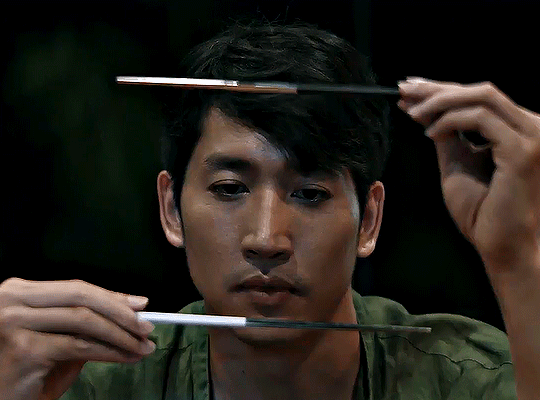
Enter Inthawut. Inthawut was Siam’s best friend, and with nothing to go on but a set of old pictures, Wang has an instinctual certainty that he is the key to the secret he’s seeking. And thus he engineers a way for he and his mom to “coincidentally” stumble onto Inthawut’s property and get invited to stay a few days in his isolated home, at which point Wang begins his campaign to figure out what the hell happened between Siam, Sasiwimol, and Inthawut at any cost.
One of the things I find most interesting about this story is how much the plot hinges on Wang going against Asian cultural norms in his pursuit of the truth. He is not respectful to his elders. He does not maintain filial piety and deference to his mother. He refuses to restrain his emotions. Instead, he is pushy and relentless and emotionally manipulative (all tricks we can plainly see he learned from Sasiwimol) and Inthawut doesn’t stand a chance against him. And so, because Wang explicitly acts against these cultural values, the truth comes out and the trauma is no longer suppressed.
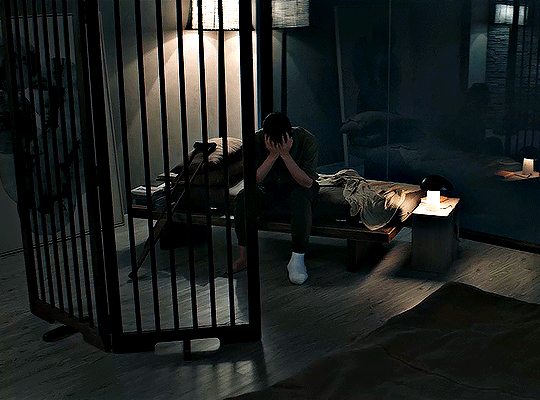
And in the end, it’s a simple, if desperately sad story: Siam and Inthawut were in love, but Inthawut was battling internalized homophobia and deep-seeded fear and so he relentlessly pushed Siam away and toward dating and then marrying their friend Sasiwimol. And when Siam, miserable in this heterosexual relationship he never actually wanted, finally snapped and confessed his true feelings, Inthawut rejected him and ran away to study abroad. Inthawut was running due to his own fear, but he also had noble notions of somehow protecting Siam from his own queerness and told himself that if he was gone, Siam would accept his heterosexual life. Of course, that did not happen, and in the fallout of this rejection Siam sank further into alcoholism and died soon after. Inthawut’s reaction was the exact worst fear of all gay people who work up the courage to confess to a friend they have developed feelings for: outright rejection, abandonment, and destruction of the relationship. And in his mind, he did this to Siam “for his own good,” a fairly textbook execution of the noble idiocy trope. In the aftermath, we see how Inthawut has isolated himself, part in penance, part in self-protection, and intellectualized his way to a romantic construction of his own cowardice that he tries to convince Wang is righteous.
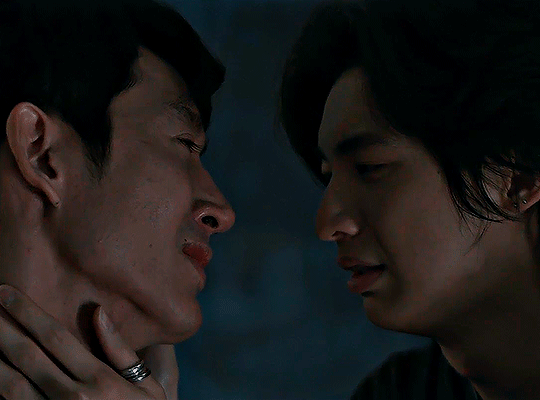
But Wang is deeply affected by how the denial of his father’s queerness ruined his life and is absolutely not having any of Inthawut’s self-denying bullshit, and this is where things get messy, as both Wang and Inthuwat seem to start seeing Wang and Siam as interchangeable and they develop an emotional entanglement that is deeply unhealthy, to say the least. Wang wants to understand Siam so badly that he starts to be him, and Inthuwat is so desperate to address his regret and shame that he starts to see Wang as Siam, as well. Wang also uses this attachment as a way to shock his mother and forcefully bring her real feelings about Siam and Inthawut to the surface. Despite Wang’s many loud protestations to the contrary, I don’t believe that he and Inthawut actually love each other. They are using each other to work out their trauma about Siam.
And they’re not the only ones! Sasiwimol seems to have her own psychological confusion about Wang as he relates to Siam, and their dynamic is very strange as a result. She refers to Wang as dua-eeng (and has taught him to do the same with her rather than calling her “mom”), a Thai endearment that literally means “self” but is often used between lovers. They have a very physically affectionate relationship that often had me grimacing in discomfort, and she clearly sees Wang as both a source of pain—because he is so like Siam—and her one source of comfort and happiness. She is a successful woman by any standard, but she’s also desperately lonely, hanging on tight to Wang as her only companion in a way that often veers into overbearing, and deeply wounded by her past with Siam and Inthawut. It was through her own friendship with Inthawut that she pursued Siam in the first place, and she clearly feels betrayed not only by Siam, but by Inthawut, both for getting in the way of her relationship with Siam and for leaving them. Her feelings about both men are complex and the story never fully spells them out, in part because Sasiwimol never does. Determinedly not thinking about what happened between them is a big part of how she copes, along with sublimating her suspicions into homophobia, which she perpetuates quite intentionally in her work via production of heterosexual romance propaganda.

Wang clearly loves his mother even as he is frustrated by her prejudices, her desire to control him, and her tendency toward emotional manipulation. He is a perceptive kid and he has studied her closely; he understands her very well and can often predict exactly how she’ll react to a situation. Which is why his decision to announce baldly to her face that he is in love with Inthawut—not only coming out as gay but declaring his intention to move out of her home and in with a man 20+ years his senior who is deeply entangled with her own trauma—felt very intentional to me. He knew what kind of reaction that would get from her, and he wanted it. And sure enough, Sasiwimol crumbles at this repetition of her trauma and the perceived disloyalty of Wang choosing Inthawut over her just as his father did. The rest of the emotion she’d been holding back comes pouring out, resulting in the three of them finally airing out everything that lies between them and everything they are feeling about the Siam-shaped hole in their lives. And once she breaks down, Wang is able to forgive her for the grievance she’s caused him and ultimately decides to remain filial and continue living with her, because he does not actually want to punish his mother for what happened to his father.

So, in the end, where did the story leave us with all this trauma? I can’t really say that any of these characters have healed, but I do think Wang kick-started that process, at least for himself. He got what he needed most out of this little scheme: deeper understanding of who his father was and why his life took such a drastic turn. He remains caught in the dysfunctional dynamic with his mother, and I’m not sure he’ll ever fully break out of it, but at least there is more honesty between them now about what they’re dancing around. She now knows he is gay and she has to accept it to keep him with her, and given that he has backed off from asking her to accept something much scarier than that, I do think she will find a way to make her peace with it. Inthawut is the character who seems to have progressed the least, standing firmly in his stasis and remaining determinedly alone with his pain, though the show leaves us with a note of ambiguity that suggests he may someday find the courage to move on.

The messages of this work are clear. Internalized homophobia and denial of your own queerness are poison for your soul. Rejecting a loved one “for their own good” is an act of cowardice and selfishness, not an act of love. Hiding from and sublimating your trauma will never allow you to heal. Refusing to process your pain will only lead to you pushing it down on the next generation. Ultimately, this story told us that bravely looking ourselves and our trauma in the face and confronting our truths head on is the only way to begin to heal, and that running from them only leads to ruin.
#180 degree longitude passes through us#thai drama#intergenerational trauma challenge#shan shouts into the void
103 notes
·
View notes
Text
It's both funny and increasingly annoying to me when Hatchetfield fans associate Bill with Blinky, the way Paul is associated with Pokey and Ted with Tinky, but leave out Alice. She was there in Watcher World too! Her eyes were also purple! She was also controlled to try to kill her family! There is no way you can think of “Watcher World” without remembering Alice's equal involvement in Blinky's scheme.
I'd argue that she's a much better fit for Blinky's special human. He forms a grudge against her for insulting and disobeying him ("Fuck you, Blinky", "You'll be sorry"), just like Pokey's fixation on Paul because he defied him. She has a theme of watching going on herself, in contrast to Bill's naivety and obliviousness: being perceptive enough to notice the creepy, suspicious elements of Watcher World; trying to use observation as a tool to control Deb's behaviour, Blinky's modus operandi (though I personally like to believe that Deb didn't actually cheat and Blinky was tricking her); and having a connection with social media in general, which Blinky is thematically similar to and embodies the worst, most harmful elements of. She's deeply self-conscious, concerned with her reputation to her peers and has an anxiety disorder. The result that she's always worrying about how people see her and feels pressured to act in certain ways by that is exactly what Blinky wants in his prey, just like how Linda is Nibby's ideal hungry Honey Queen. She's interested in theatre and wants to be a playwright, to write shows where people will passively watch characters struggle and suffer for their own entertainment. Blinky creates live plays too - he even proudly says “Welcome to the show!" when the father and daughter's duel begins. She knows how to manipulate people by showing them what they want to see, giving her script draft a tragic ending for the queer main characters that's more likely to get it accepted in the discriminatory industry, when in fact she wants to change the ending once she has more power.
And she alone defeats her Lord in Black. Pokey assimilates Paul. Tinky breaks and owns Ted. Nibbly consumes Linda. Wiggly completely enslaves Linda and leads her to her death, and Wiley is unshakeable from his allegiance to him. But Alice? She overcomes the mind control, pushes through her panic attack, shoots Bliklotep in his all-seeing eye and goes home with her dad. And lets go of her independent issues with perception and image by putting down her phone.
She is so much like Blinky, and so much his perfect victim. Except that she wants happy endings. For the characters in her stories, for herself and for the people she loves. And she has the strength to make them come true. She's Blinky's equal and opposite. The hero to his villain. She can do everything he can, on a human scale, but she believes in happy endings.
I know the fandom likes the 'CCRP eldritch horrors’ favourites gang', and that is fun. But give Alice the respect she deserves! I see her as Blinky's Ted while Bill is his Pete; also a valued toy, but more by proxy than in his own right.
#she was literally doomed by the narrative in-universe and saved herself#and was saved by her dad#she is a PLAYWRIGHT THEATRE CHARACTER she can rewrite her own narrative!#she SHOT and escaped a lord in black#respect her!#alice woodward#my beloved#bill woodward#blinky#bliklotep#watcher world#nightmare time#hatchetfield
112 notes
·
View notes
Text
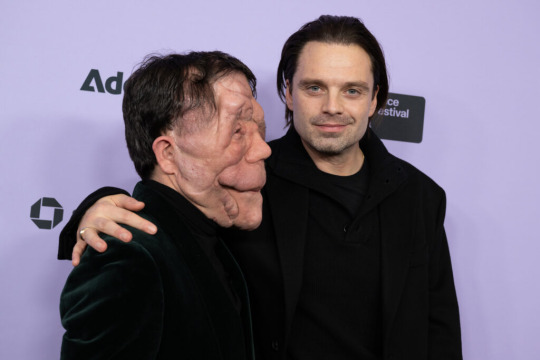
*SPOILERS*
Aaron Schimberg kept it brief in his introduction before A Different Man had its world premiere January 21 at the 2024 Sundance Film Festival: “This is the one time I have to be able to show a film without anybody knowing anything about it.” A hush fell over the Eccles audience as the writer-director said that. It’s true. There’s before you see A Different Man, and then there’s after. The before is full of anticipation for the complex drama starring Sebastian Stan, Adam Pearson, and Renate Reinsve. The after is a rush of heart-clenching realizations about your own sense of self-worth, the true values of society, and questions about the ownership of your identity and story — even if you aren’t sure you want to own it yourself.
Edward (Stan) is an actor...
with a facial disfigurement who sticks to himself, doesn’t fix the leak in the ceiling of his apartment, and books parts in training videos for companies to learn how to treat people with disabilities just like everyone else. When his doctor tells him of a new experimental procedure that can “cure” his appearance, he decides to try it so he can be treated normally, like the people in the horrific training videos he shoots.
As Edward’s facial growths start to peel off — in a scene one can only describe as a moving Francis Bacon painting — instead of feeling relief, he still feels the need to hide who he is from everyone. That includes his playwright neighbor Ingrid (Reinsve), who has thrust herself into Edward’s orbit without fully letting him into hers.
His solution? To fake his own death and reemerge as a new “normal” guy hastily named Guy. This shedding of his skin seems to be working — he gets a new job as the most shiny of real estate agents and has a new, fancy loft apartment — until he sees that Ingrid has followed through on her goal to write a play with a part for him. Unfortunately, the play is about him, her dead neighbor, and their relationship through her eyes.
This is where A Different Man starts to fold in on itself in a brilliant meta statement about representation and authorization within the entertainment industry.
“[The film] is playing with various disability tropes,” explains Schimberg during the post-premiere discussion. “Like the sad disfigured man in his apartment, and playing around with those elements.” Since Edward’s story starts with that trope, it leaves the viewer uncomfortable and upset when we see Ingrid using these same tired storylines. It proves that she never really knew Edward, but had no problem using his disfigurement to push through a play about her being a “good person.”
But, wait, weren’t we introduced to Edward in the same fashion? The film doubles down on this complication by having Edward-presenting-as-Guy beg his neighbor to let him play her version of himself within her off-Broadway show. Even with the face of an actual Hollywood movie star, Edward is bending his life around the preconceived notions of others. His desire to be both the before and after Edward is complicated further when Oswald (Pearson), an effervescent and charming man with similar facial disfigurements as the original Edward, enters the theater during rehearsal and proceeds to take his role and his relationship with Ingrid away.
On the subject of casting this complicated weave of an identity story, Schimberg recalls how thorny that was even within his own singular vision: “I thought you’re caught in a bind because some people said that casting Adam was exploitative, and then on the other hand casting a Hollywood star and putting him in prosthetics is also the opposite of what we think of as representation, even though it’s still very commonly used. So I was caught in a bind and I just thought: I’m going to do a movie that does both. I’m going to have a Hollywood actor in prosthetics, I’m going to have Adam be Adam and see what comes of it and build some kind of path forward.”
That path forward is a masterful film filled with tension. But while it might seem like the struggle is going to be between Edward and Oswald, A Different Man’s only true tension is within Edward himself. Stan excels as he wrestles with embarrassment and longing for his former face. Every time someone comments on Oswald’s appearance to Edward while he’s passing as Guy, you can feel the hot anger within him because they assume he agrees with their vile opinions. “Suppression is a really bad thing,” Stan says, passionate about his character and this creative journey. “That was my take on [why Edward hid his true identity]. But I think, sometimes, when you spend so much time denying yourself you don’t have the courage in those moments to speak up.”
“That was kind of the hook we gave to Sebastian,” Pearson continues. “Yeah you don’t know what it’s like to have a disfigurement, but you do know what it’s like to not have privacy and to have your life constantly invaded, for better or worse.” Stan nods his head emphatically, “Public property, right?”Pearson nods back at him down the line. “Yeah, those are the kind of chats we had to get it right.” He pauses and chuckles.
“I’m glad it wasn’t a physical battle because I would have lost that one.”
64 notes
·
View notes
Note
Hi! I’m pretty new to the world of Achilles and Patroclus (I read The Song Of Achilles last month) and I just saw your post about your love for them. When you said “there's just so much stuff out there about them (tsoa, hades game, the iliad, a bunch of other myths and adaptations, non fiction books, academic papers etc)” I was wondering if you could touch on the other myths and adaptations part maybe? I’m not exactly sure where to begin there but I would appreciate any guidance you could give!
Oh boy I don't know where to start either because there's a LOT. I don't want to overwhelm you so I'll just list a few key myths and adaptations off the top of my head:
Adaptations
So as far as adaptations go, I will include works where both Achilles and Patroclus show up and that are inspired by the Iliad.
Hades Game: I'm pretty sure you're already familiar with this, just mentioning it just in case!
Aristos the musical: it's a musical as the name suggests, and it revolves around Achilles and Patroclus' lives from Pelion all the way to Troy. It's really lovely and has made me emotional on numerous occasions and I love revisiting it every so often! It also has a Tumblr account: @aristosmusical
Troilus and Cressida: this is Shakespeare's take on the Trojan War and it's quite interesting, not really faithful to the Iliad but offers a sort of different perspective on the characters and the events that led to Hector's death.
Achilles (1995) by Barry JC Purves: it's a short stop motion film using clay puppets, it's on Youtube and it's only 11 mins and I think it's worth a watch! I find it very compelling visually and any adaptation where Achilles and Patroclus are lovers is a plus in my book 🫶
Holding Achilles: this is an Australian stage production by the Dead Puppet Society, I really enjoyed it and I found it an interesting blend of TSOA and Iliad Patrochilles, which also featured some cool new elements that I hadn't really seen before. It used to be free to watch for a while but now I think you have to pay to watch it, there's more info on their website.
The Silence of the Girls: a novel by Pat Barker, it's a take on the events of the Iliad mostly through Briseis' eyes, I personally didn't really like the book or the characterisations but hey both Achilles and Patroclus are in it so it might be worth a read.
There are some other novels I've heard of where Achilles and Patroclus appear (A Thousand Ships by Natalie Haynes, Wrath Goddess Sing by Maya Deane) and also a TV show called Troy: Fall of a City but I haven't read/watched them so I can't really rec them
Myths
Most myths revolve around Achilles, there aren't that many with Patroclus I'm afraid, but here are some of my favourites:
Achilleid by Publius Papinius Statius: this is an epic poem about Achilles' stay on Skyros disguised as a girl and his involvement with Deidameia. It's interesting but I'd personally take the characterisations and events in it with a grain of salt because Romans were notorious for their unsympathetic portrayal of Greek Homeric heroes but it's still a cool thing that's out there and free to read online.
Iphigenia at Aulis: a tragedy by the ancient Greek playwright Euripides, it's basically the dramatised version of the myth of Iphigenia's sacrifice in Aulis which predates the Iliad, there are many obscure versions of this myth but Euripides' sort of updated version is my favourite, I will never shut up about this play!! Lots of a nuance and very interesting portrayals of Achilles, Agamemnon, Menelaus, Clytemnestra, Iphigenia and pretty much everyone in there, well worth a read.
Lost plays: there are several plays in which Achilles appears but that have been lost or survive only in fragments, but two of my favourites are Euripides' Telephus and Aeschylus' Myrmidons. Telephus takes place before the Trojan War, while the Greeks are on their way to Troy. I really like Achilles' characterisation in the fragments that remain and also the fact that he was already renowned for his knowledge of medicine and healing despite how young he was. The fragments that survive from Aeschylus' Myrmidons I think are fewer but the play was extremely popular at the time it was presented to the public and it sparked a lot of controversy re: Achilles and Patroclus' relationship and who tops/bottoms so I think that's kind of funny lol.
There are lots of other obscure little myths about Achilles that I've picked up by reading various books, papers and wiki posts on the matter and that are just too numerous to list here, but what I will mention and that I think concludes the myths section of this post pretty neatly is that the Iliad and the Odyssey are not the only works about the Trojan War that were written, merely the only works that survived. The rest of the books in the Epic Cycle have been preserved either in fragmentary form or in descriptions in other works, and I think the Epic Cycle wiki page is a good place to start if you want to get an idea of what each of those books contained.
I hope this helped! 💙
#patrochilles#achilles#patroclus#the iliad#homer's iliad#if I remember anything else I'll probably add to this post but I think that should be enough for now#there's just! so much stuff!!#happy reading/viewing/listening 😁
46 notes
·
View notes
Text
Okay, so after seeing Asteroid City a bunch of times, I thought I should probably write down my thoughts, so here they are
(warning this is kind of long)
Thoughts On Asteroid City:
“4th wall break”, or When The Characters Become the actors:
Woodrow constantly looks at the “audience” (the camera) during the film, this is because the understudy is playing Woodrow and is not used to the audience
“I still don’t say I forgive you”: at first I thought this was Midge saying this to Augie, but upon watching it again, it actually seems to be the actor Mercedes saying it to the director Schubert, who had written her an apology letter.
“Hey, do you feel any different?”: this is a stretch, but the day after the alien takes the asteroid, Midge asks Augie if he feels any different. He answers that he doesn’t, and asks if that’s odd, and Midge says that she also doesn’t feel any different. Now, taking into account Augie’s actor Jones’ (probably) very fresh grief and shock over the death of his lover Conrad (the playwright), coupled with the fact that he doesn’t answer with his line immediately (probably because he’s dissociating), this makes me think that Midge’s actor, Mercedes, is actually asking if he feels any different now that Conrad is gone, and Jones is in too much shock to actively feel anything
The Quickie Gridle: In the scene where Augie burns his hand on the Quickie Gridle (something that Jones had asked Conrad about at the beginning of the film, “Why does Augie burn his hand on the Quickie Gridle?”), it looks as if Mercedes is in actual shock when his hand hits the griddle. She asks him why he did it, and his answer is, “it’s unclear” because Conrad never told him why.
(there is probably a great deal more that I don’t remember, I might add more
Augie/Jones:
I was put onto this by @mummer, and after going to see the movie again with the idea that the movie is partially about Jones trying to process his grief, a lot of scenes were put into a different light and honestly I enjoyed it even more.
Obviously, we have the scene where he goes on his backstage rant (which I did not realize he did while they were doing an active performance and not just a rehearsal). It seems to be him searching for the meaning in Conrad’s passing (and also the meaning of life in general) in his play, but being ultimately told by Schubert that it doesn’t matter if he doesn’t understand the meaning, because he just has to keep going
“I feel like my heart is breaking, my own personal heart.” “Good.”: this comes across to me as Jones finally being able to get past his shock and actually feel something about Conrad’s passing through the lens of playing Augie and Schubert telling him that the pain is good and healthy
“Am I doing him right?”... “I think you’re doing him right.”: again, this could be a stretch, and it makes sense to interpret it literally, however… Jones is, again, actively grieving for a partner that could not be grieved in public. This could be his way of subtly asking if he’s doing it right, if he’s doing the play the way Conrad would have wanted, if he would have been happy with him and his performance, and Schubert’s answer of “I think you’re doing him right” could very well be an attempt to comfort him and saying that he is doing right by Conrad, that he would be proud of him.
“Use your grief.” Again, this could just be how the play was written, but if that isn’t some great advice for Jones I don’t know what is.
“I think you might have to try to replace me.”: The scene with the actress that played Augie’s wife and her quoting the dialogue to Jones, essentially speaking what has been going through his head since Conrad died.
Also I think it was extremely intentional that we get the news that Conrad died directly after the above scene.
Again, there are probably more that I forgot or have already been said somewhere else.
Misc.
(these are more just little things)
The way the cowboy Montana’s actor is not present in the beginning line up and is instead represented through a painting over the teacher June’s actor’s head
The little roadrunner puppet!! Which you can see being played with when Jones goes backstage
The little scene where the narrator just appears and then is like, “Am I… not in this one?” And then leaves and the actors go back a line of dialogue
The way we only see some of June and Montana’s relationship and only know they got together because the mechanic’s actor came out and told Jones
The picture of Augie’s wife being exactly how he described her in the little monologue
Augie’s laugh after he told the girls they weren’t orphans
“That business with the pipe and the camera and the eyebrow.” – Schubert to Jones
The scene with Schubert and his wife, I loved the way that even though Schubert is obviously torn apart by this, he still understands that his wife doesn’t love him the same anymore and lets her go
The memory game that the brainiacs play
Woodrow and his Grandfather have the exact same hairstyle
“I play him as a metaphor.” “For what?” “Well I don’t know, we never pinned it down.” – Jones and the actor for the alien.
The colors!!!
Basically all the times the brainiacs interacted
Where does Ricky's father sleep??? Where does Ricky sleep?? Cause they were not sleeping in the tent.
Montana's perfect, stereotypical cowboy speak
And so much more I might have to update this if I remember
151 notes
·
View notes
Text
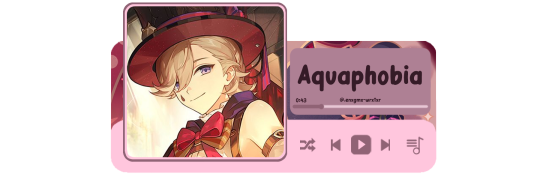

SYNOPSIS: Lyney never feared the sight of the tank, but his "Father" changed that for him. (gen. neutral reader) [ IDENTITYV AU ]
CW/s: Drowning (or almost drowning), ooc Lyney? (he's shaken up oops), depiction of Knave! Lyney/Harbinger! Lyney, near death scenario, reader gets hurt in helping survivor! Lyney (part 2 of 3)

The familiar thumping of one's heart was something Lyney is quite used to. To him, as a magician, he would only have those when performing tricks that are impossible— only for them to work as the audience began to shower him with praise.
As an illusionist, he knew well that miracles are akin to magic tricks. That is what he was raised to believe, but outside of his job, there are things far more cruel than he may say.
So when he felt himself getting dunked into the tank his sister used in one of their shows, he felt the air leave him as he was put inside.
He banged on the glass as he saw his Father? leave, the illusion fading into a sight he can discern. He thought it was her?, but the familiar coat and attire betrayed his expectation.
It was… Himself?
… As the Knave.
He felt his eyes widened. Was this suppose to be him?
If Father gets replaced or dies, will he become like this?
The hunter turned his head to see the stunned illusionist, water pouring down to fill up the tank. And for a sheer glance alone, he could see him mouth the following words that shocked his core.
And then, he left.
His siblings are far from where he was chaired. And Heaven forbid will he let them rescue him like this.
The water is filling up to his knees.
Was this the end? He couldn't tell anymore.
After all, he knew he can turn the fates in his favor. He knew that, he was a magician! And by God will he just stop because he's stuck in a water tank!
As he felt his legs grow damp, he began to do anything in his power to get out. He tried to push the lid, perhaps use his own tricks to disappear from the tank.
He wanted to get out of this blasted tank. He was growing desperate.
At times like these, he wished he had his vision on his person.
But alas, no such luck.
His efforts rendered futile, and his desperation gnawed at him alive.
...
It's rising to his waist.
...
He wanted to crumble.
He couldn't hear the faint calling of a familiar voice— and a yelp from the hit by the grim-malkin cat. The one he had from his tricks.
He can vaguely recall how some of his tricks failed. How he and Lynette endured to get a sliver of fame, to even get a chance to perform.
This was one of those times.
He knew this moment awfully well. And the familiar despair began to get to his head.
...
It's rising to his chest.
...
Was this it? Is this the end of the road?
It can't be. I can't die here. I can't.
I can't stop here— why can't I do something? Why is there no exits here?
I can't simply drown in this tank and disappear. I don't want to disappear!
No, no, no—
Please, I need to see my sister again. I need to see my siblings again.
I refuse to sit here, and yet...
... I don't know what to do.
Can I even escape from this glass prison?
Can I escape the same prison I've been destined to be trapped in?
...
Then, it rises to his neck.
…
...
…
The seal of the tank opens.
Two hands grabs him, and with one full swoop, the playwright pulls the illusionist out as a way to rescue him.
Lyney was stunned when he felt the water leave him, and albeit he is dripping, he could smell the scent of parchment and ashes.
(Name).
"Are you okay, Lyney?" he heard them asked, watching as the tank closes but the water level remains the same. "Here," they added, handing him a syringe that they retrieved from the chests.
Am I okay?
"Come on, let's go—"
They yelped and went down as the hunter— himself— loomed over them, sighing.
"Oh, my dear poupée, you should've learned not to turn your back on a hunter!" his hunter identity said, but the playwright turned to wince and glare at him.
"Hah— and you should learn not to be so cocky."
Then, the sirens blared. And detention got ahold of the Knave.
With adrenaline, they shoved the now coherent illusionist.
"Run!" you yelled, grabbing his wrist and pulling him with them out of the big tent. "Detention will last in 2 minutes— and we'll both die if we get caught by him!"
And as soon as the two of you fled, the survivors could hear the ever familiar yet chilling laugh as the Knave is in pursuit of his showstopper.
No man will be left alive.
Not on his watch.

@.enxgmx-wrxtxr | do not republish, repost, or copy my works anywhere | 2023
#☁️ | drafted anecdotes#genshin impact#genshin#genshin impact lyney#genshin lyney#lyney#genshin impact x reader#genshin impact au#genshin angst#lyney angst#genshin x reader#genshin impact lyney x reader#lyney x reader#genshin lyney x reader#astronetwrk
93 notes
·
View notes
Text
literally what do you MEAN the coyote got run over offscreen and the roadrunner is alone and left unchased!!!!!!!!!!
#mumbling to myself death is random and meaningless death is random and meaningless the world is disrupted quietly no one knows what to do#the story cannot progress there is a story beneath the story. There is no one to tell it what to do#everything is unfinished and empty a life that never got to be fully written except it did but how could that be it???#and then it does a little dance!!!!!!!#WES ANDERSON IM GONNA KILL U WITH A MAUL WHAT THE HELL#this is the saddest movie ever made guys im crying voer a roadrunner#im not doing it right!#everyone is dealing with loss they're all alone and they have to perform their roles and they cant and they dont know how or why#this is a love story this is a death story this is a story story#GOT RUN OVER. OFFSCREEN. LIKE. THE PLAYWRIGHT?#the playwright who gets run over offscreen?????????#he predicts his own death a hudnred times over. The. the#how am i supposed to wait for saturday i need to see it again neowwwww#haunted ghost movie!!!! but haunted in a calm and slightly hopeful way#death isn't scary the alien isn't scary. he's just there. he's gonna take something from you and you're gonna feel like#the world is upside down and on fire and scary and you're not gonna know what to say. but it wasnt personal. It didnt mean anything really.
23 notes
·
View notes
Text
The Five Stages of Reading Albert Camus
1. The Discovery – ”The Stranger” (1942)
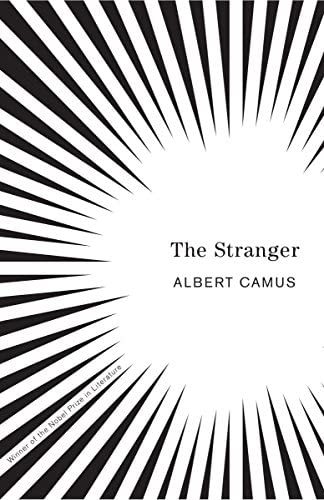
„The Stranger” is unquestionably the best choice for anyone who wants to get to know Albert Camus. It's so simple that it fools you at first. You think it's going to be an easy read, but when you finish the book and put it down, you don't even know your name or if it even matters to have a name. It will probably keep your mind busy for months and make you think about the true meaning of life. You will most likely never be the same person again.
2. Falling in Love – ”Betwixt and Between” (1937) // ”The Fall” (1956) // ”Exile and the Kingdom” (1957)
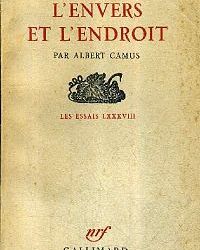
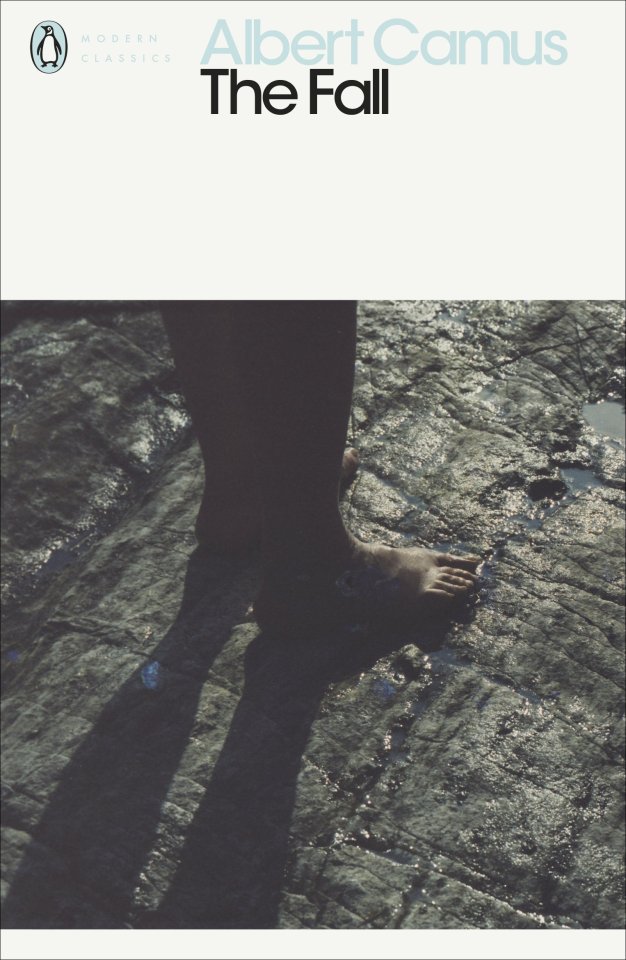
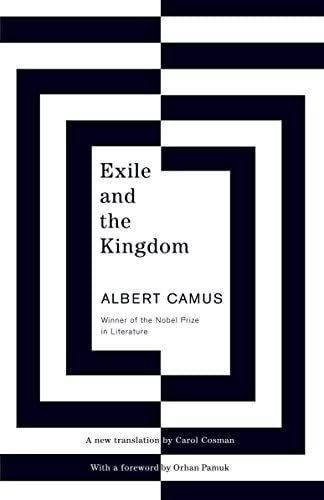
After "The Stranger" has had time to settle and stick in your mind (a process that takes about six months to a year), it's time to explore other writing. Camus doesn't use the same language in every book, so it's important to be careful what you choose to read after. The best options to fall irrevocably in love with this French philosopher are ”Betwixt and Between”, which is his very first published book, ”The Fall”, which offers a very interesting narrative perspective, or ”Exile and the Kingdom”, his only collection of short stories. After going through these, your heart will be caught in the nets of love for Camus.
3. The Surprise – ”The Plague” (1947) // ”A Happy Death” (written 1936–38, published 1971) // ”Summer” (1954) // ”Nuptials” (1938)

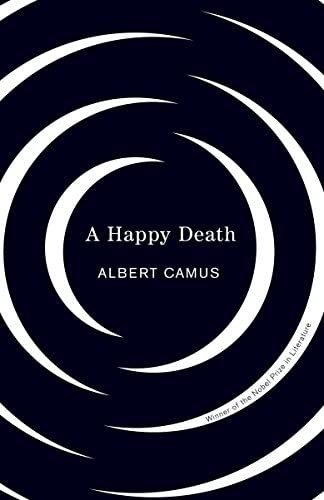

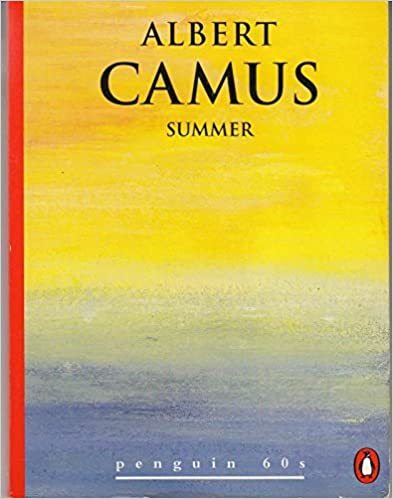
After the reader has gone through the above books, he will have the impression that he knows Camus. Now is the time for him to have the surprise of his life. Camus managed the feat of not giving the audience the same thing twice. That is why each of his writings is unique. Some are easier to read and digest, some are not. At this stage, it is time to get acquainted with its more difficult side. "The Plague" is a story that shakes you to the core and is difficult for even the best readers to get through. ”The Happy Death” should never have seen the light of day, being the first version of what we now know as The Stranger. "Summer" and "Nuptials" are dubbed essays and are similar in format to ”Betwixt and Between”, but here Camus approaches a completely new language, so poetic and refined that it instantly wins you over. Only after the reader goes through these books can he say that he understands a part of Camus.
4. Not just a writer – ”The Myth of Sisyphus” (1942) // „The Rebel” (1951) // Theatre Plays // Journalism Articles
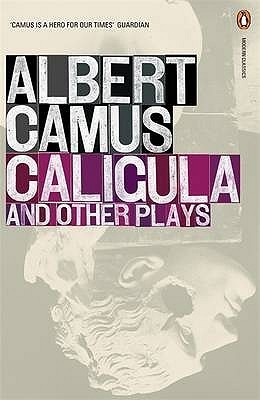
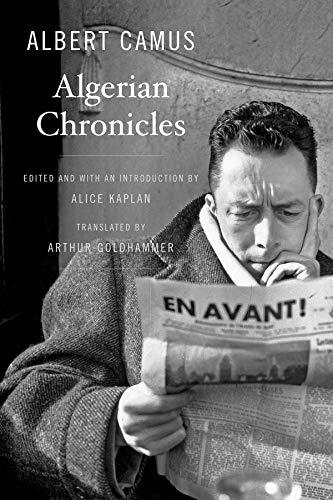
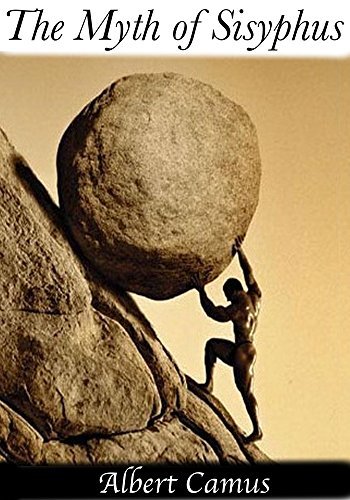
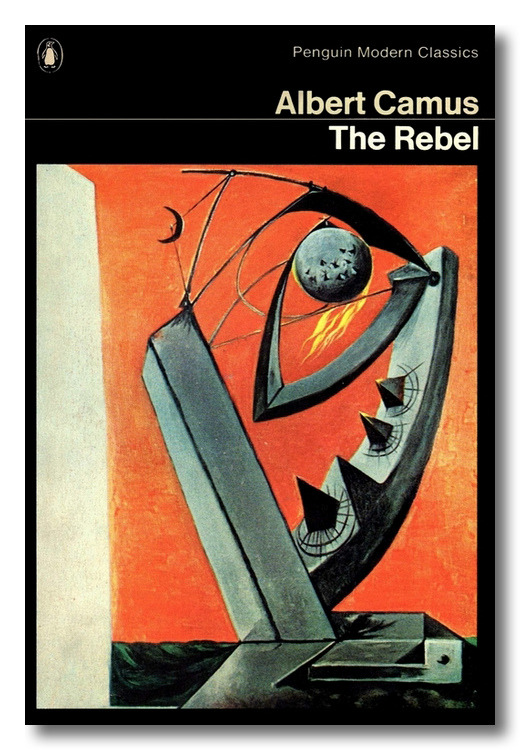
Camus was not only a great French writer. He was also a philosopher (though he never called himself that), a journalist and a playwright. If you are interested in fully understanding Camus, you must also understand his writings in other fields. "The Myth of Sisyphus" is the essay that formed the basis of the formation of a new philosophical current called absurdism. "The Rebel" continues the work started by "The Myth of Sisyphus", going much deeper into the issues related to the meaning of life, art, war, etc. Plays like "Caligula" (1938) or "The Misunderstanding" (1944) are wonderful pieces of art in the history of the theater, while summing up the entire philosophy of Camus. His journalistic articles reveal a Camus involved in society, trying to change something in one way or another through writing. "Reflections on the Guillotine" (1957) for example was an important work that contributed to the abolition of the death penalty in France. Camus never confined his writing to a single specialization, and this can be seen in the skill with which he explored the power of the word in its various forms.
5. Camus the Human – ”The First Man” (incomplete, published 1994) // ”American Journals” (1978) // ”Correspondence (1944–1959)” // ”Notebooks”
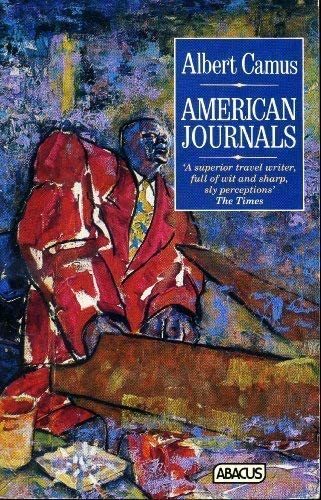
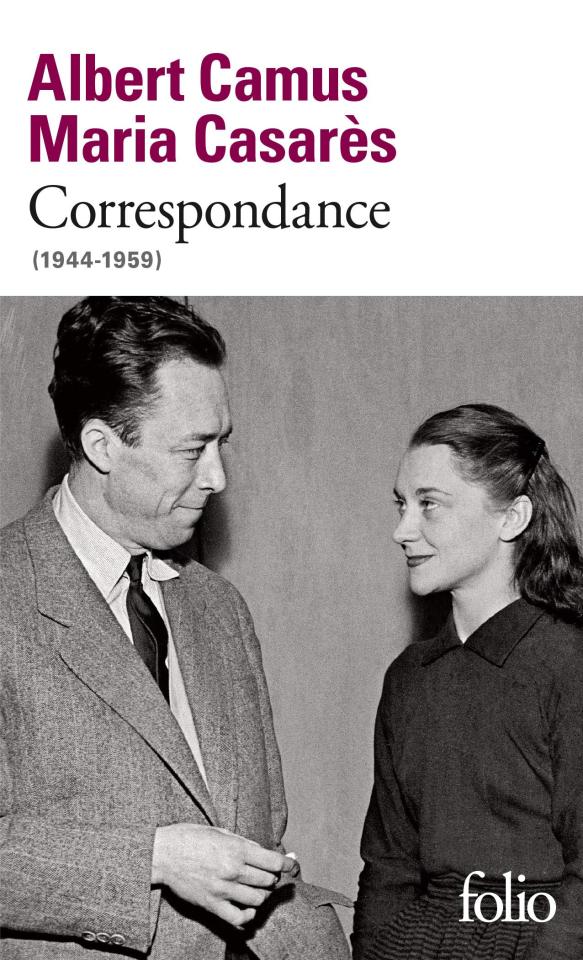
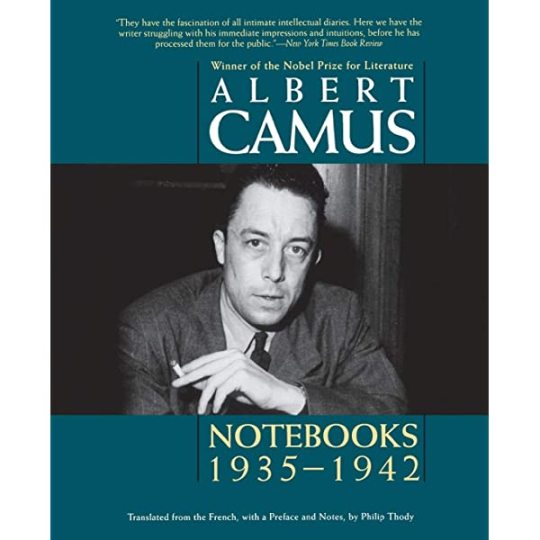

At this point, after going through all these readings, we also want to find out who was the man behind the word. Camus put many things from his personal life into writing, but in this selection we have the most personal point of view. ”The First Man” was supposed to be an autobiographical novel, but Camus died before he could finish it. The remaining manuscript was revised and published years after the author's death. "American Journals" captures a highly sensitive moment in his life, an existential crisis in Camus's life. ”Correspondence” is an exchange of letters between Camus and the woman with probably the greatest influence in his life, Maria Casares. Finally, the "Notebooks" are a collection made from the notes that Camus wrote over the years in his countless notebooks. Every intimate thought, beginning of a novel, reflection, trace of feeling, all these complete the image of Camus as a man.
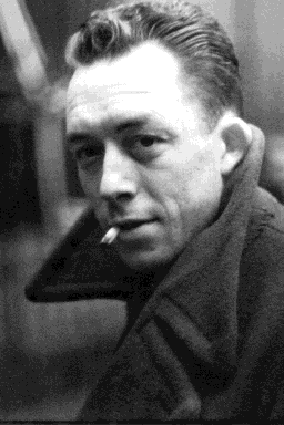
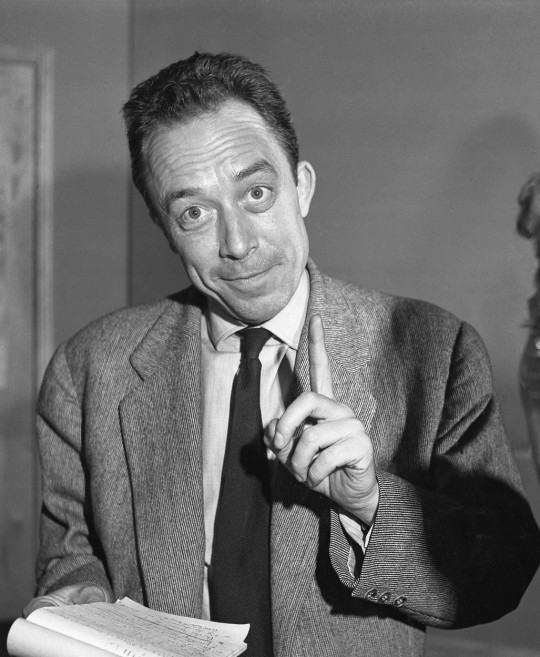
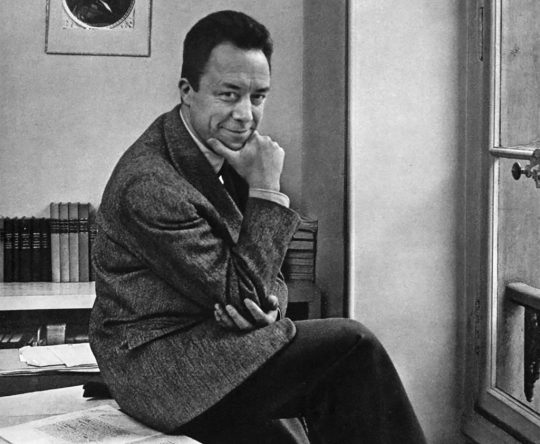
Congratulations! If you have reached this point, you have managed to go through all the stages of knowledge and you can call yourself a true fan of Albert Camus. Now go and spread his teachings to other little outstiders. And don't forget, the only purpose of life is to be happy (reading Camus together).
#albert camus#camus#camus quotes#classic literature#literature#french literature#albert#the stranger#the plague#the fall#exile and the kingdom#20th century#20th century literature#classic authors#a happy death#the first man#betwixt and between#nuptials#summer#the myth of sisyphus#the rebel#philosophy#philosopher#20th century philosophy#absurdism#absurd#existentialism#the theory of the absurd#notebooks#american journals
340 notes
·
View notes
Text
So what if
Dream is sort of Shakespeare's patron, right? So would that make Shakespeare on of His™? And if so, would he reside in the Dreaming after his death instead of the Sunless Lands?
'cause if so. Consider.
He's still writing. (A lot)
He keeps up with modern literature, but keeps writing (at least mostly) in Early Modern English (that's it, right? Do I have my lit facts straight?). Imagine his recent plays littered with slang, disney references, (un)subtle references to shit that was based on his stuff that he either loves or hates, both are good.
He's kind of a favourite of Dream's. The same way Lucienne and Jessamy and The Corinthian are. He can get away with saying shit, because if he offends Dream he can turn around and start sprouting some poetry at that vain-ass bitch and all is forgiven. (In the worst cases it takes a new play about his royal majesty the Dream King and how generous and benevolent and regal he is)
Fishbowling happens, not sure what Will would do, the plot bunny didn't care.
Dream is back, all is well, he goes to the New Inn, Hob and Dream are now officially Friends.
They meet up more bc friends see each other more often than once a century. Oh yeah friends also know each others' names and such. So Dream tells Hob a bit about himself.
At some point he's like, hey hob u wanna see the dreaming?
Hob's like yES PLz??
Hob gets a tour, and from that point on usually gets the option at night to dream normally or visit the palace.
On one fateful night, Hob decides to take a stroll through the library, goes looking for Marlowe's shelf, because he kind of wonders what other stuff that genius would have written had he lived longer.
Only to (maybe literally) bump into, you guessed it, Will Bloody Shaxberd.
He stares.
Will goes 'hey'.
And then Hob goes somewhat feral.
(no he is not over it, sue him, he's allowed to hold a grudge.)
He goes off on a rant about, see, ofc ur still plagiarizing marlowe he was so much better i can't believe dream left me for you you useless twat you couldn't write shit without him so why did you get the fucking privilege of living with him and knowing him for fucking centuries i had to fight 600 years for his bloody name and i'm guessing you got it right that first meeting hm?
And Will goes oh shit it's you! And then cuts Hob off with a "you're so right! I was an absolute shit playwright before your friend helped me!"
And Hob is... Understandably lost. This was not how it went in his head.
And then Will continues, I was so nervous the time right after that meeting, I knew he was some sort of supernatural being, no clue what though, he's really not good at introductions, is he, so I sort of assumed you were too, and I was waiting for your revenge for stealing your date away, recently found out you're actually human, albeit immortal, and it was not a date, though, speaking of, have you sorted yourselves out yet?
And Hob, quite understandably even more baffled, sort of gapes for a bit.
Before very nervously denying anything of the sort.
Will just stares.
And goes, bruv, you weren't subtle then, still aren't now, spare everyone else the UST, please, for the love of god, you two need to fuck post haste.
And Hob is like, hahaha, eh, yeah, nope, fun seeing you, BYE.
So Will sighs. And goes to see Lucienne, as any sensible person would.
Lucienne sighs as well. At which point Will steps to Dream himself.
"My lord?" "Yes, William?" "Forgive my directness, but so as not to risk any misunderstandings, what exactly is your relationship with Hob Gadling?" "We are friends. Why do you ask? Is that not clear?" "Well, to be perfectly honest, m'lord, I assumed you were... Involved™." "We are not." "But you'd like to be though, right?" "You dare presume to know-" " I dare presume to know what attraction, romance, love, all that looks like, sire. I must do, after portraying it in my plays for over four centuries. After writing several hundreds of sonnets on the topic." "I-" "In my humble opinion, my lord, it is a good match. He understands you, you continue to fascinate each other, he can provide a safe place where you need not be monarch for a moment. And of course, you are quite obviously attracted to one another sexually." "WILLIAM SH-" "Oh calm down! I'm certainly not judging either of you!" "...he is attracted to me?" "..." "Is he?" "YES! Lord give me faith! Kiss him! Go to him and teleport the both of you onto a bed! Or if you want to be sappy go slow and bring him a rose, but please, for the love of the collective sanity, do something!" "But how do you know? What if you misunderstood? What if it is unwelcome? I cannot lose him!"
At which point Will turns around, leaves the throne room, goes back to the library and rant to Lucienne
"I swear I'm going to write a play about them, just to point out how stupid this is. I feel compelled to call it a tragedy, but I think it needs to have a happy ending, otherwise Lord Broodphius would get stuck on the but what if it does end in tragedy, so I suppose a comedy would be fitting, but then again, this is too painful to watch to qualify as a comedy. Tragic comedy? Comic tragedy? I'll figure it out..."
And Lucienne is like, if you'd like to perform it properly I'm sure there are a few dreams who would be more than willing to help out, take on a role.
Hob comes back to the Dreaming a few days later and finds Will up to his elbows in paper, reference books, thesauruses and rhyming dictionaries (handy things those), and empty mugs and the like.
Will looks up, somewhat manic, and is like, Hob! Great! Just the person I wanted to see! Would you help me, please?
Hob's like, sure? Kind of apprehensive, but he gave everything some thought and decided that as long as he could go on dunking on him, he could let go of most of his jealousy (cuz that's what is was, he's mature enough to admit)
Will goes, Awesome! Tell me about you and Morphius! How do you see him, what's your story, I only ever get bits and pieces from his lordship, so I'm in severe need of some context...
And Hob is somewhat suspicious, but he indulges him, and really, telling the story comes too easy, so he gets into it completely and doesn't even notice when he starts slipping into rants about Dream, about how beautiful, and magnificent, and misunderstood, and kind, and way-out-of-his-league-but-god-dammit-he-went-and-fell-in-love-with-the-bastard-anyway he is
And Will takes studious notes.
And then goes like, so some of the sonnets I've written were with you two in mind, you wanna give me some feedback? (Ahem, sonnet 24/29, some others work too, undoubtedly, but I am no Shakespeare expert, unfortunately)
And he does something similar with Dream, maybe citing Hob's dislike of him as the reason he wants to know more about him without having to bother him overly much, like, I want to set things right between us, but I need to know more about him to do that, will you help me, m'lord
And he does
And Will just sits back and takes notes as Dream also spirals into a passion fueled rant about Hob
And all those notes end up in the eventual play
Auditions for the roles happen when Dream and Hob are out on a Not Date™ in the Waking.
There are surprisingly many auditioning for Hob's role, and surprisingly little for Dream's
Until Will points out that Dream would probably be more offended by an unworthy portrayal of his Love that of himself, at which point some of the dreams bow out entirely, bc Will knows how vain their lord is, so they decide not to risk unmaking and tactically retreat
Will is in his fucking element, it's been way too long since he's properly directed a play!
Eventually Will comes up to the Mutually Pining Idiots like, hey m'lord, Hob, I've written a new play, and I've been working with some of the dreams to make it happen, do you want to see??
So they watch. They watch as two absolute fucking idiots stumble around each other, everyone on and off stage can see how stupidly in love they are except for them, and both start sweating profusely when they start recognizing their own words quoted back at them.
The end of the play is something of a direct call-out and a plea from the dreams to please just talk to each other, fuck and get married, preferably in that order, but they're not picky.
Then everyone leaves them alone for the Conversation that is most likely going to happen.
Will stays behing hiding unobtrusively in the shadows tho.
He's not about to let all his work go to waste if these idiots ty to play it off again. He will lock them in a broom closet if he has to, watch him.
They don't.
Luckily.
There are like three sentences total spoken. Then they're aggressively making out.
Will leaves the room very content about his matchmaking skills.
And hey! He got a good play out of it, if he does say so himself!
#the sandman#dream of the endless#dreamling#dream#hob gadling#the sandman netflix#centennial husbands#dream x hob#hob x dream#morpheus#morpheus x hob#hob x morpheus#will shaxberd#hob hates shakespeare#plot bunny#i say bunny#but at this point it's a hare#this got long#and way out of hand#honestly it just started with hib stumbling across shakespeare in the dreaming#and ranting to him#and will being surprisingly mature and such#then this happened#lucienne#and will#just sighing over these#idiots#together#mutual pining#idiots to lovers
363 notes
·
View notes
Text
Heavy Lies the Crown: Rhysand, greatness, and the pressures of power
Or: the librarian’s daughter, former playwright, licensed counselor mashup of my nightmares dreams because I am vast, I contain multitudes.
No content warnings and no real HOFAS spoilers, I don't think, other than that he's in it but I feel like you know that by now. Spoilers for Breaking Bad (lol).
---
In working on my current fic (on ao3 here!) I've been thinking a lot about Rhysand and how he really goes off the rails in ACOSF and HOFAS. It's easy to chalk it up to poor writing, but I like the challenge of trying to make it make sense. What are Rhys’ motivations, truly? What would explain the vast array of heinous shit he does the text tells us is justified?
Rhys is shown over and over to be quite Machiavellian ('ends justify the means' dude, who was maybe writing satire). It's easy to list the times he shows this. The 50 year Velaris hostage situation. The bargain UTM with Feyre. The Weaver's cottage. Stealing the Book from Tarquin. CLARE BEDDOR. Infiltrating people's minds. Torture. Assassination. Allying with Kier. Concealing his wife's medical information. Being an ass to people in general. According to Mr. Machiavelli, any action is warranted if it the goal it achieves is morally important enough.
It seems like Rhys can justify anything to himself if he believes it will serve the greatest good at the end of the day. He does so many things with the air of “it’s for your own good” or “you’ll understand why one day” but that day never.. comes? Not yet anyway, which begs the question: is he that unself-aware, or is there a longer game he’s playing that all of these minor skirmishes are leading up to? What if he knows what's coming? And what kind of cause or threat would feel so great he could justify everything he does up to this point?
Okay I'm gonna talk about Aristotelean literary structure, please don't leave me.
The idea of a tragic hero is a character whose downfall is inevitable but who fights against it anyway. Hamlet is a classic example of a tragic hero, Oedipus being the de facto first, Walter White from Breaking Bad a more modern version. We see Walt learn he’s going to die in the first episode, in the middle he does a bunch of stuff to prevent his physical death (cancer) and metaphorical death (failure/obscurity), and then both his body and reputation die in the last episode as a direct result of his attempts to avoid fate. It’s blissful Aristotelean symmetry. *chef’s kiss*
Every tragic hero has hamartia, more commonly known as a ��fatal flaw’. In Hamlet, his fatal flaw is procrastination, and his delays create space for all kinds of the fuck shit he was trying to prevent. It’s important to note that hamartia is by design a neutral term - not so much a flaw, but a trait, motivation, or decision that sets off the chain of events the character is trying to avoid. Tragedies have occurred equally from too much love as too much hate, and doing nothing is just as much a decision as doing something. The word itself comes from the Greek for ‘to miss the mark’. To try and fail, the backbone of tragedy.
One of the most common hamartia is hubris, a modern synonym for arrogance but which more specifically means an outsized belief in one’s ability to affect and control the future. Well-known tragic heroes taken down by hubris include our boy Walter White, Tony Soprano, Viktor Frankenstein, Achilles, Jay Gatsby, Kendall from Succession. It exists in real life, too: Lance Armstrong is a perfect example of a modern tragic hero brought down by hubris. And what do all these men have in common? Power, via money, fame, strength, the state, intellect, violence etc.
I’ve been enjoying looking at Rhysand through this tragic hero lens because while it doesn’t really make him more sympathetic, it does make his actions easier to understand logically, which is its own kind of humanization. If Rhysand is aware of a prophesied or fated event sometime in the future and is pulling the cosmic strings now, it must be incredibly important, like annihilation-level important, which is so much pressure.
So he grows to maturity with an understanding that he will one day have to face this intense evil that could completely destroy his world, and it plants in him a hubris. He believes that his immense power grants him a certain amount of influence automatically. And honestly, is he wrong?
And this is where it’s important to think about how power makes people weird. Power gives people a false sense of confidence in their actions and choices, because their status and privilege protect them from so many more consequences. In this way it’s easy to see how someone can get a big ego - no one is stopping me, so I must be doing well! Or: everything is going well for me, so I must be really killing it! I know I feel that way in the first tingles of hypomania, but hypomania is fundamentally a distortion of reality and I believe so is power.
Power not only gives people confidence but also access to make decisions for others. They begin to think they should share the success they’ve found by leading and guiding others to see how great it can be if you do what they say. Just look at one of those cringe 'billionaire morning routine' videos to see what I mean. It’s a very patronizing form of altruism, because the leader genuinely believes they have the people’s interest at heart. And I use the word patronizing intentionally - leaders have often referenced feeling paternal towards their people, Winston Churchill + FDR, 'God the Father'. Power and fatherhood have been linked for a long time. And direct from our girl Wikipedia, "paternalism is action that limits a person's or group's liberty or autonomy and is intended to promote their own good".
I was talking with a girlfriend of mine recently about how I think some men don’t have the experience of other people depending on them in a significant way until they get married and/or become fathers. Like, afab and femme people learn very early to be considerate of others, to think about how others feel, to act in ways that keep others happy, etc. This plants in us a sense of duty to perform in ways that please others, to smile, to create comfort and provide caretaking in every environment we enter. So by the time we get to marriage and motherhood, we already know how to put others’ needs before our own because we’ve been doing it from the jump.
For men, however, this can be a completely novel experience. And it seems like it's SO HEAVY FOR THEM. George ‘Father of his Country’ Washington just wanted to go back to Virginia the whole time he was President. So many men talk about the pressures of being a provider and their families depending on them in a way women don’t, and I think it’s because for the first time others truly depend on them and they don’t know how to handle it.
In response, they either shove down their emotions as patriarchy demands and have a midlife crisis, or they abdicate that responsibility and go completely absent physically and/or emotionally to continue living for themselves. (Obviously there are good men and dads out there, and bless you if you’re lucky enough to know, have, or be one.)
And this aspect of power feels relevant because from the text it seems like Rhysand is unraveling. Between Feyre, the baby, the Trove, Nesta and being threatened by her power, Koschei, Bryce, the whole High King shit - I think he’s starting to crack under the pressure. And honestly, I’m kind of surprised it didn’t happen before now.
According to Aristotle, the tragic hero must:
Be significant (virtuous/capable/powerful/important etc.)
Be flawed
Suffer a reversal of fortune.
Rhysie boy definitely ticks the first two. I wonder what it would look like to get to three? I don’t think Sarah has the balls, but it’s definitely enhanced my reading experience and given me a lot of interesting things to think about.
Okay that's all I've got. Love ya, see ya soon xx
#prythian university#acotar#acosf#rhys critical#sjm critical#tragic hero#lit crit#i love thinking way too deeply about things
36 notes
·
View notes
Note
Do you have any yowzah headcanons?
anon, i am so so so sorry i took so long in answering this but to be fair, i consider this such a loaded question because GOSH the amount of headcanons i have about these two but okay okay i'm finally doing it.
River locks away some encounters with the Doctor and sometimes when she's cheeky - okay, she's always cheeky with them (who are we kidding) - she uses a totally random set of words to unlock those encounters.
Then the Doctor is just chilling with Companion or some random being - no, let's make the stakes higher. Doctor and Companion(s) running away from danger or are in a life-and-death situation and said words get uttered and the Doctor just goes ballistic and the poor companion doesn't have a clue. Their captors end up letting them go.
Said words are in different languages by the way.
River and 11 had kids. And 12. I mean it was implied that River's pregnant in The Impossible Astronaut/Day of the Moon sooo...
The Doctor has a habit of going back in time and meet up with different painters, poets, playwrights, sculptors, etc. to commission stuff with River as the subject.
After Area 51 happened for both of them, they would greet each other with the number of anniversaries they had lived through.
Older 11 does his best to soften the blows he knows young River will experience as she moves along her timeline.
11 bought an entire archeological set and placed them all in his bigger-on-the-inside pocket in case River would need one.
The Doctor hardly slept before River. After loosing her, they couldn't sleep in their bed anymore. Because they kept on reaching for her and kept finding it empty.
Older River loves winding up younger versions of the Doctor because an older Doctor did the same to younger her.
The Doctor has a room dedicated to stuff they think River would love.
River's lipsticks taste like sweets because the Doctor likes sweets.
The Doctor hates it when River puts her hair up in a ponytail. Considers it a crime worthy of being banned by the Shadow Proclamation.
The Doctor keeps one of River's guns hidden in the console.
River has met older regenerations of the Doctor but her memories of them are locked away.
Her memories of 12 pre-Darillium were unlocked when 12 uttered "Hello, Sweetie".
The Doctor (11) hangs red balloons whenever he and River are doing "humany-wumany stuff".
River's love for funny-looking socks rivals the Doctor's love for hats.
An older Doctor taught young River Gallifreyan; an older River corrects a younger Doctor's Gallifreyan.
They both tell each other bedtime stories. A younger Doctor would be told bedtime stories by an older River. A younger River would be told bedtime stories to help keep away the nightmares. When he began telling younger River bedtime stories, he realized he was the one who started that tradition and she was doing it with her past and him in mind.
River is Patience, the Doctor's wife on Gallifrey (invisible string theory)
#thanks for the ask!!#river song#the doctor#doctor who#doctor x river#eleventh doctor#yowzah#doctorriver#twelfth doctor#patience#thirteenth doctor#fourteenth doctor#fifteenth doctor#just listed some and not all because i have a 7:30am class UGH who thought classes at 7:30 fucking am is okay??
34 notes
·
View notes
Text
Rhysand x Playwright! Reader (Enemies to Lovers) Part 2
Y/N wasn’t sure what she expected from the Night Court. A black, towering structure filled with death and depravity. The tortured screams of prisoners. Flames being fanned to burn bodies alive.
“As if I’m the king of hell,” Rhysand chuckled.
“You might as well be,” Y/N shot back.
“I bring you here and that’s what you say to me?” demanded Rhysand.
Y/N looked around at the room. Marble floors, white, tall columns, and open air plan. It was…nice.
“So when are we going to…” Y/N didn’t know how to finish that sentence. The place of her nightmares.
“You’ll go when I say you’ll go,” Rhysand retorted. Only he knew that he had no intention of bringing her down there…unless she suddenly became okay with it.
Biting back tears, Y/N said, “Fine.” It was only a matter of time. Rhysand couldn’t be nice for too long.
Rhysand let out a sigh. “Anyone tell you you’re a paragon of sunshine and optimism?”
Y/N was too exhausted to snap at him to stay out of her head. “Got to represent the Day Court right.”
Rhysand was surprisingly amused by this. “Oh, is that what the Day Court values? I would have thought pageantry, certainly. And bringing me down, for sure.” He lifted her chin with his finger so she was looking right at him. “How much of that was Helion and how much of that was you?”
A resentful shudder coursed through her. “Wow. You’re asking me this now? You couldn’t have asked me this before you kidnapped me from my home, from everything I care about?”
“So you’re saying you were just following orders?” he asked mockingly.
It would be easy just to blame Helion so she could get off scot-free, but no. She was already here, and she doubted Rhysand would believe her anyway, since he was undoubtedly reading her mind at the moment. “No. I hate you, and dissing you through the plays just coincided with that. You’re not supposed to mix business with pleasure, but I enjoyed bringing you down. A lot.”
She expected Rhysand to look taken aback, but he just smirked. “Any reason you hate me so much?”
“How about everything?” The words came out before Y/N could stop herself. “You and your court are known for literally torturing people. Women are treated like chattel, being sold off to the highest bidder. There’s nothing but violence and cruelty, and you’re in charge of all of it. You keep it going and you do nothing to stop it. You have the power to change things and make them better, but you don’t. Not only that, you enjoy it.”
“I suppose you’re right,” Rhysand said after a long silence. “You’re right to hate me. Do you mind if I ask you something?”
“Does it matter if I mind?” Y/N asked, exasperated. Rhysand’s eyes narrowed, about to say something. Y/N had nearly forgotten how dangerous he was in her annoyance at him and didn’t want to push her luck. “Yeah, go ahead, ask.”
“Why the comedy? Why not make your play a horror if what you say is true?” He crossed his arms, waiting for a response.
“Because laughing at something makes it less scary, or at least it’s supposed to,” replied Y/N. Plus she wanted to criticize Rhysand’s politics in a fun way that people would enjoy.
“I see,” Rhysand nodded. “Come with me.” He led her into a sprawling library filled with books. It also had a crackling fireplace in it, cushioned armchairs, and multiple writing desks.
Y/N was not expecting Rhysand to have such a nice library. Y/N could spend the day in here if this were in any other place but the Night Court.
“That’s exactly what you’ll be doing,” Rhysand said. “As High Lord of the Night Court, I need to inspire fear. The subjects of your plays have made their way to the Court of Nightmares, and now they think they can defy me. That is your fault, and you need to fix it.”
“Why me?” Y/N asked. “Surely you have more talented playwrights in the Night Court to take care of that problem.”
“I may,” Rhysand admits. “But I want you to do it. That’s how retribution works, you see.”
Or revenge? Y/N wondered.
Rhysand smirked. “That too.”
“Do you ever stop reading my mind?” Y/N demanded.
“Not if you insist on making your thoughts so loud,” Rhysand replied.
“So the play,” Y/N said. “Anything specific you want it to be about? Why in particular people should fear you?”
Rhysand smiled. “I’m sure whatever your imagination can come up with is far worse than what actually happens in the Court of Nightmares- unless you’d like me to take you down there myself for a tour.”
“I’m good,” Y/N said. “Yep, imagination. That’ll do it.”
“You really are afraid, aren’t you?” Rhysand taunted.
“Prick,” said Y/N, giving him the finger.
After that, Rhysand left her alone to write. He’d left her the finest, thickest paper and really nice pens with fancy ink to write with. Y/N tapped her pen against the paper, wondering what to write. The last thing she wanted was to give Rhysand access to her nightmares, but he probably already did, since he had no sense of privacy when it came to her mind.
~
“I like it,” Rhysand said as he read over her work. “Did anyone tell you that you’re a very good writer?”
“Helion,” she said. “Or at least he was going to, before you showed up.”
Rhysand didn’t look offended by this, only amused. “If this is how you speak to a High Lord, I wouldn’t be too sure about that.”
“Fuck off, Rhysand,” Y/N said.
“See? Exactly,” Rhysand said smugly.
“Helion was going to give me this huge playwriting award, but now that’s done,” Y/N sighed.
Rhysand had the decency to look sympathetic. “At least now your playwriting will be used for a greater purpose,” he said.
“Yeah,” Y/N scoffed. “Making you look scary. Greater purpose indeed.”
“Do you not think my needs are important?” Rhysand needled. “As High Lord you have to make sure you’re respected by your people. Something you’ve done your very best to destroy.”
“Honestly, I wasn’t trying to do that,” Y/N admitted.
“You weren’t trying to make me seem like some sort of joke,” Rhysand said doubtfully.
“No, of course I was,” Y/N said. “I just never thought my work would reach the actual Night Court. It was mostly to entertain the people of the Day Court and get my award from Helion. Pissing you off and starting a rebellion in your court was a…bonus, I guess.”
“You really have a negative opinion of the Night Court, don’t you?” asked Rhysand.
“You’ve given me no reasons not to,” Y/N said.
“Good,” Rhysand said, straightening his lapels. “That’s just how you should be thinking if you’re going to write these plays.”
Y/N was surprised that Rhysand didn’t even bother to defend himself, or his court. If he was so proud of what it represented, why didn’t he? She mused as she studied the ground. If anything, he seemed…aware of all the flaws that Y/N had called out in her plays for Helion.
“I am its High Lord,” Rhysand said, making her head snap up. “I know what we are. How we come across to the world. And I intend on keeping it that way.”
“But why?” Y/N asked. “You don’t even want to try to make it better?”
Rhysand shrugged. “You said it yourself in this play. I delight in terror, and so do those under me. Why fix what works so nicely?” He straightened the script’s pages. “I’ll make you a deal. I can send this to the Day Court, to let Helion know how satisfied I am with your work. Maybe they’ll put it on there just to appease me, and you’ll win your award after all.”
By doing the exact opposite of what she set out to do. Rhysand really was a prick.
Rhysand chuckled. “Why? You still wrote it. You’re still the playwright worthy of that award.”
Even though these were nice words, Y/N couldn’t accept them. Not from her enemy! Who had taken her from everything she loved and made sure she would never be able to write the plays of her dreams. Who was forcing her to do exactly what she hated- making sure Rhysand and his Night Court still thrived.
“Suit yourself,” Rhysand said. “But I remain impressed.”
#rhysand headcanons#rhysand x reader#rhysand imagines#enemies to lovers rhysand#rhysand#acotar#a court of mist and fury#a court of thorns and roses#acotar imagine#acotar fic#acotar fanfiction#rhys acotar#rhys x reader
40 notes
·
View notes